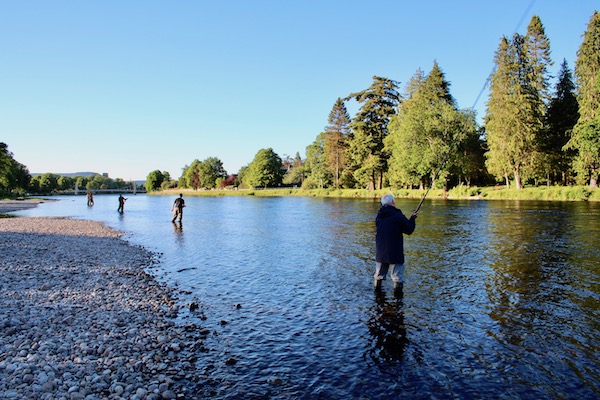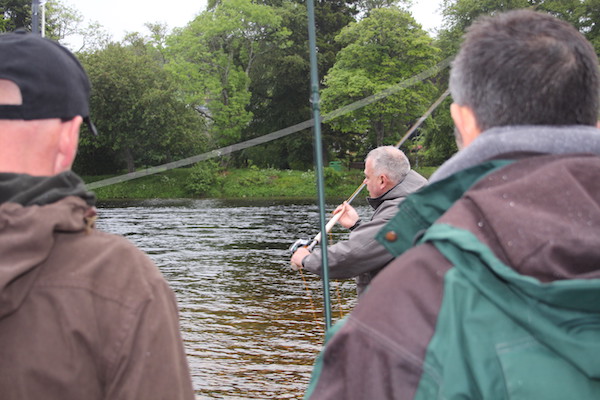Items filtered by date: June 2019
Mill park re-opens
Members and visitors will now be able to park in the anglers’ car park by the Mill Stream as the hole in the surface has been covered by a steel plate. As the tourist season gets into full swing, the Holm Mills Shopping Village car park gets very busy with cars and coaches. Consequently, anglers are asked to use the riverside car park, access to which is kindly permitted by Mill management.
Calling all coaches!
It was a busy night at the club Casting Clinic this evening (Wednesday, June 26) as adults and juniors, fellow anglers and parents developed their Speycasting and trout rod skills. And it is expected to be just as busy at the final class next Wednesday (July 3). As a few of the regular coaches will not be available, the club is calling on all their trained coaches to attend to ensure adequate instruction for all.

Trout casting: Davy Dyce passes on his skills

Application: Anglers develop their Speycasting skills
Volunteers needed
The club is still looking for volunteers to assist with bank clearing works this coming Sunday (June 30). The work party will meet at the Mill hut at 10 am. If you can help, please advise membership secretary John Ralph on 07702 889841. Please remember that the anglers’ car park there is still closed off as surface repairs have yet to be completed.
Good weather for training
Fingers crossed, but it looks as though the weather will improve in time for the club’s Casting Clinic from 7 to 9 pm on Wednesday (June 26). The forecast is for sunshine, temperature around 18 degrees and a gentle breeze from the north-west.
World Speycasting champion Scott Mackenzie will be at the Little Isle Pool of the River Ness to help anglers develop casting skills with big salmon rods while trout casting will be taught on the grass of the adjacent Bught Park. He will be supported by instructors David Mateer and Frank Durdle, and qualified club coaches.
As ever, all are welcome to attend. Bring your own tackle if you can but club equipment, specially donated by Loop, will be available. The final clinic will be held on Wednesday, July 3.

Champion: Scott passes on casting tips
Scottish Government issues advice for anglers finding diseased salmon
Over the last few weeks there have been numerous reports of disease in wild adult salmon populations. These reports have been widespread ranging from Scotland to Scandinavia. The common factor is death through aquatic fungal infection (Saprolegnia), an infection which displays along the underside of the fish. There is evidence from northern Scottish rivers that the fungal infection is preceded by what looks like a rash on the underside of the fish with associated haemorrhaging. See photos.


At the moment the condition is not thought to be a transferable disease and the disinfection of gear, tackle, waders etc after fishing on other rivers is not yet required, unless direct contact is made with fish displaying signs of fungus.
However, you are probably aware that some river systems have erred on safety first and require anglers to disinfect prior to fishing.
Thankfully no affected fish have so far been reported on the Ness system.
For ease of reference the following has been copied from the Scottish Government website:
Reporting Skin Damage in Wild Atlantic Salmon (17 June 2019)
Scottish Government’s Fish Health Inspectorate (FHI) has been responding to reports of wild adult salmon displaying skin damage such as reddening (petechial haemorrhaging) around the fins and belly (ventral surface), inflamed (swollen/red) vent and associated fungal infection
Further information will be provided when the laboratory results are available from fish sampled across a number of Scottish rivers.
In the meantime, observations of adult salmon demonstrating clinical signs of infection or damage should be notified to the local District Salmon Fishery Board (DSFB) and the FHI by the folowing means:
Ness District Salmon Fishery Board Telephone: 07944617202 or 07789006078
FHS Telephone: 0131 244 3498. Email: This email address is being protected from spambots. You need JavaScript enabled to view it.
Considerations are:
-
Moribund or lethargic fish should be targeted where sampling is considered appropriate;
-
There is no requirement at this stage to remove fish with damage for disease control purposes;
-
Wild adult Atlantic salmon returning to rivers to spawn can naturally present with some physical damage due to a number of environmental factors;
-
FHI sampling will be prioritised on moribund fish that can be maintained alive (in keep nets or suitably bio-secure tank facilities);
-
Moribund fish that cannot be maintained alive should have details recorded and photographs taken, where possible, before being returned to rivers. Details should be sent to local DSFBs and FHI;
-
If local wild fishery interests determine that moribund fish are not to be returned to the river, they should be percussion stunned or suitably dispatched and maintained in a refrigerator at 4°C, until a determination on sampling is undertaken;
-
Good biosecurity practice should be followed when handling affected fish with hands, clothing and equipment being suitably cleaned and disinfected, where appropriate.
Bank works begin
As anglers anticipate the arrival of the main runs of River Ness salmon, volunteers are needed for clearing the banks of the club water to ensure comfortable access and casting. A start will be made on the right bank on Sunday, June 30, when a work party will convene at the Mill hut at 10 am. Many hands make light work - so let’s have a good turnout.
Casting clinic cancelled
Rain and a cold, upstream wind put paid to Inverness Angling Club’s Casting Clinic at the Little Isle Pool tonight (June 12). Club officials decided that, rather than press on with a class in miserable weather conditions, the series would be lengthened into July. The remaining clinics will now be held from 7 to 9 pm on June 19 and 26, and July 3.
IAC Casting Clinics continue
Tonight (Wednesday, June 12) sees the second in Inverness Angling Club’s annual series of Casting Clinics. All are welcome at the Little Isle Pool of the River Ness, and the adjacent Bught Park, where the skills of Speycasting and trout casting can be taught or improved by experienced instructors and coaches.
Leading instruction, from 7 to 9 pm, will be three times world Speycasting champion Scott Mackenzie, instructors Dave Mateer and Frank Durdle and club coaches. If you own a fishing rod please bring it along, If not, the club can provide salmon and trout outfits kindly donated by international tackle company, Loop. The series will continue each Wednesday in June.

Attentive: Taking tips from top Speycaster
Waders needed to access Ruthven boat
Recent heavy rain has pushed up water levels on lochs and rivers in areas around Inverness. One such loch is Loch Ruthven where access to the IAC boat requires more than a pair of wellies! Club members planing to fish the loch should take thigh waders with them until the water level drops.
Following the recent purchase of a new boat for Loch Ruthven, the club is offering for sale a boat trailer that is no longer required. The price is £150 or near offer. Interested parties should contact club treasurer Gordon Smith on 01463 238197.

Bargain: Trailer for sale
Odd year suggests arrival of pinks
Fisheries Management Scotland (FMS) have issued fresh advice to anglers and fishery boards about dealing with Pacific pink salmon which could arrive in Scotland’s rivers this year. It follows the capture of unprecedented numbers of pinks across the UK in 2017.
Originally introduced to some Russian rivers in the 1960s, pinks have now colonised some northern Norwegian rivers. It is from these rivers that the 2017 arrivals are thought to have ‘strayed’. They spawn earlier than Atlantic salmon, have a two-year cycle and derive from distinct odd or even year stocks. Those that arrived in the UK in 2017 were from odd year stocks, so it is possible that they will occur again during 2019.
While the Wildlife and Countryside Act 1981 makes it an offence to fish for and retain pink salmon, FMS advise that anglers catching pink salmon should humanely dispatch and retain the fish, and immediately contact the local fishery board who will arrange collection. IAC membership cards list a contact for the Ness District Salmon Fishery Board. Information required is the date, place and method of capture, and the sex of the fish. Any sightings of unusual spawning activity in August and September should also be reported.
Fresh from the sea, pinks are steel blue with blue-green on their backs, silver on the flanks and white on their bellies. There are large spots on the backs, upper flanks, adipose fin and tail. The fish are uniform in size, reaching only 40 to 60cms in length and have a white mouth with black gums. In the spawning phase, males develop a pronounced humped back.
